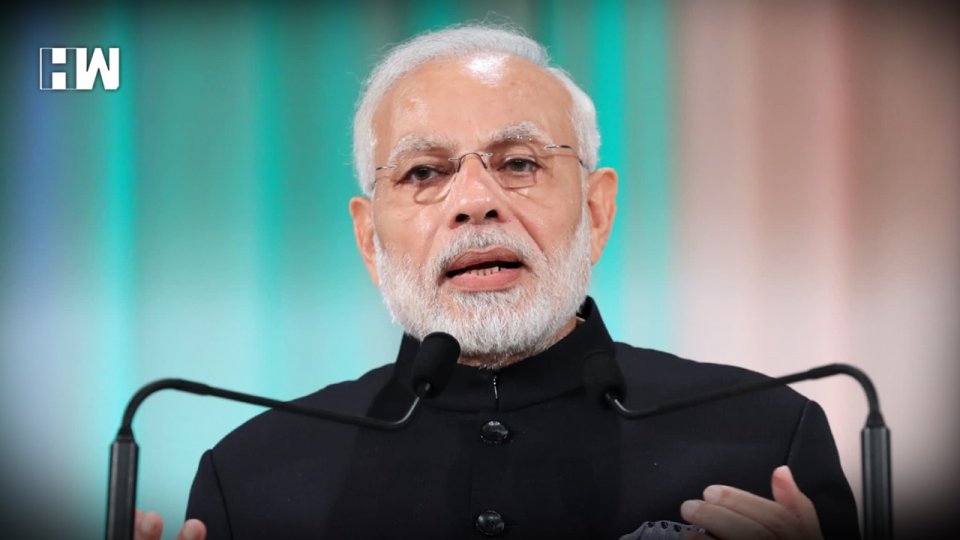New Delhi | Riding on a massive Modi wave sweeping through most parts of India, the BJP was set to return to power Thursday as it led in 292 seats while the Congress trailed far behind with 51, according to trends released by the Election Commission for all 542 seats that went to polls.
If the trends stay until final results, the BJP would have improved on its 2014 performance when it had won 282 seats on its own in the 543-member Lok Sabha. Adding the seats won by its allies, the BJP-led National Democratic Alliance could win 343 seats, up from 336 in 2014.
Markets cheered the trends, as the benchmark BSE Sensex touched 40,000 for the first time and NSE Nifty breached the 12,000 level. The rupee appreciated 14 paise to 69.51 against the US dollar trade.
“Prime Minister Narendra Modi — Many Congratulations for securing such a big victory for the BJP. I am thankful to the people,” External Affairs Minister Sushma Swaraj tweeted.
The results are a resounding endorsement of Prime Minister Narendra Modi’s popularity, his government’s achievements in the last five years and his campaign, which centred around national security and nationalism. He also relentlessly attacked the Congress Party for what he called its dynastic legacy, and blamed it for the country’s woes. The opposition had criticised the BJP campaign as divisive and polarising.
Still, the trend shows that the Modi wave has swept across geographies, caste lines, age, gender and economic status.
In the politically critical state of Uttar Pradesh, where the Samajwadi Party-Bahujan Samaj Party combine had posed a stiff challenge, the BJP was leading in 56 of the 80 seats at stake. The SP was ahead in eight and BSP in 12. Although the BJP had won 72 seats in the last elections, the performance is much better than what many exit polls had forecast.
The Congress Party was ahead only in one seat in Uttar Pradesh. Even, Congress President Rahul Gandhi was trailing BJP’s Smriti Irani in Amethi by nearly 7,000 votes but was clearly ahead in Wyanad in Kerala.
The Modi wave not only swept through the Hindi heartland and Gujarat, as was expected, but also rippled through West Bengal, Odisha, Maharashtra and Karnataka. Only Kerala, Tamil Nadu and Andhra Pradesh appeared untouched. Even in Telangana, where it was expected to fare poorly, the BJP was ahead in four seats, the same as the Telangana Rashtra Samiti.
“The people on the ground are not buying the narrative of the opposition that people are under threat. People are doing well that they are looking forward to the next government of Narendra Modi. We have to realise that Modi’s government inherited very weak economy and he done very phenomenal job (in the last five year),” BJP spokesman Amit Malviya said.
In Odisha, the BJP was ahead in nine of the 21 seats and Biju Janata Dal was ahead in 11. In 2014, the BJD had won 20 seats and BJP took one. BJP ally, Janata Dal (United) was ahead in 16 seats.
As votes for the seven-phase Parliamentary polls were counted on Thursday, the Trinamool Congress Party was leading in 25 of 42 seats of West Bengal while BJP was ahead in 15, up from two it held in 2014. The Left was wiped out in the state, once its citadel.
The DMK was ahead in 20 seats in Tamil Nadu.
As the trends came in, pointing to another tenure of Modi as prime minister, celebrations broke out in the BJP’s party offices across the country with people dancing to the sounds of drums.
The trends of the ruling party’s leads were in sync with the exit polls, most of which predicted that the BJP-led National Democratic Alliance (NDA) would be on course to retain power for a second term.
In 2014, the BJP won 282 seats, leaving the Congress with an all-time low of 44 seats against the 206 it won in 2009.
The counting exercise is on in over 4,000 counting centres amid concerns raised by opposition parties over alleged tampering of EVMs. They have asked the Election Commission to ensure transparency in counting.
Election Commission officials said results are expected only by late evening.
The voting was staggered between April 11 and May 19 in which around 67 per cent of the nearly 900 million eligible people exercised their franchise to elect 542 members of the Lok Sabha from a total of 8,049 contestants.
For the first time in Lok Sabha polls, the EC is tallying the vote count on Electronic Voting Machines with voter verified paper audit trail slips in five polling stations in each assembly segment of a parliamentary constituency.
It will effectively mean that out of nearly 10.3 lakh polling stations, the EVM-VVPAT matching will take place in 20,600 such stations.
In case of a mismatch, the results based on paper slip count will be considered as final.
Out of the 543 Lok Sabha seats, elections were held in 542 constituencies as the EC had cancelled polls to the Vellore constituency on the ground of excessive use of money power.
The Union Home Ministry on Wednesday alerted all state chief secretaries and directors general of police about the possibility of eruption of violence in different parts of the country during the counting of votes.
“This is in the wake of calls given and statements made in various quarters for inciting violence and causing disruption on the day of the counting of votes,” a Home Ministry statement said.
As an independent media platform, we do not take advertisements from governments and corporate houses. It is you, our readers, who have supported us on our journey to do honest and unbiased journalism. Please contribute, so that we can continue to do the same in future.

